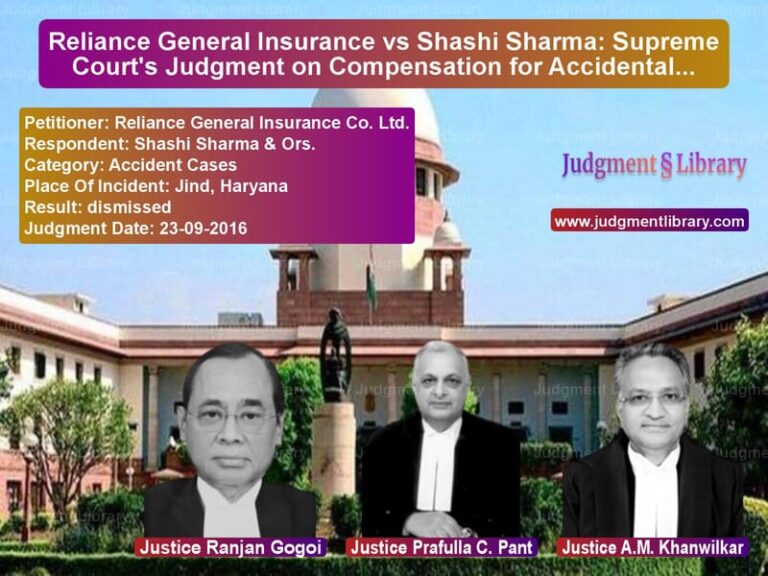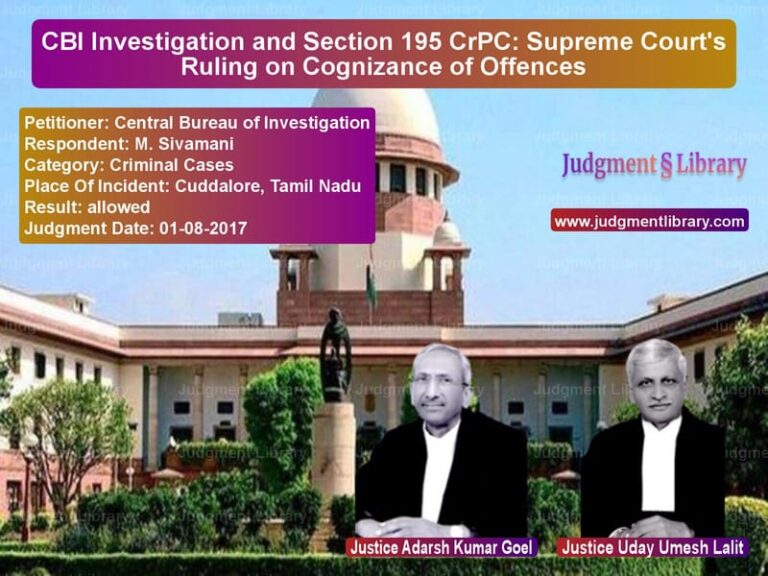Contributory Negligence in Motor Accident: Supreme Court Upholds Compensation with 50% Reduction
Motor accident claims often involve disputes over liability and contributory negligence. The case of Mohar Sai & Anr. vs. Gayatri Devi & Ors. revolved around whether the deceased was partly responsible for the accident and how compensation should be determined. The Supreme Court, in its judgment dated April 27, 2018, upheld the Chhattisgarh High Court’s decision that the deceased was liable for contributory negligence to the extent of 50%, reducing the compensation awarded.
This ruling is significant as it clarifies the application of contributory negligence in motor accident cases and sets a precedent for similar claims.
Background of the Case
The dispute arose from a motor accident that occurred on November 14, 2006, in Chhattisgarh. The claimants—widow, children, and parents of the deceased Krishna Kumar Sahu—filed a claim under Section 166 of the Motor Vehicles Act, 1988, seeking compensation of Rs. 20,21,000 for the death of Krishna Kumar.
According to the claimants, Krishna Kumar was in his Pan shop when appellant No.2, Prem Lal Rajawade, came with a friend, Narendra Panika, and convinced him to accompany them to Village Belia on a motorcycle. While returning, the motorcycle skidded due to excessive speed, and all three riders sustained injuries. Krishna Kumar succumbed to his injuries while being taken to the hospital.
Legal Proceedings
Trial Court Decision: The Motor Accident Claims Tribunal (MACT), Koriya, Baikunthpur, held that the accident occurred due to rash and negligent driving by Prem Lal (appellant No.2). The Tribunal estimated the deceased’s monthly income at Rs. 3,000, applied a multiplier of 15, and awarded compensation of Rs. 3,85,000, along with 7.5% interest per annum.
High Court Decision: The Chhattisgarh High Court reversed the Tribunal’s finding that Prem Lal was driving the motorcycle, holding that the deceased himself was the driver. Based on this, the court ruled that the deceased was liable for 50% contributory negligence, reducing the compensation by half to Rs. 3,86,500.
The appellants (owner and driver of the vehicle) challenged this decision before the Supreme Court, arguing that no liability should be imposed on them.
Key Legal Issues
The Supreme Court examined the following issues:
- Whether the deceased was driving the motorcycle at the time of the accident.
- Whether contributory negligence applies and how compensation should be calculated.
- Whether the appellants were liable to pay compensation.
Arguments by Both Parties
Petitioner’s Argument (Mohar Sai & Prem Lal Rajawade):
- The deceased was driving the motorcycle, so liability should not be placed on the appellants.
- The High Court’s decision to impose 50% contributory negligence was incorrect.
- The appellants come from a poor background and cannot afford compensation.
Respondent’s Argument (Gayatri Devi & Others):
- The accident resulted from rash and negligent driving.
- Even if the deceased was driving, the owner of the vehicle was responsible.
- The High Court rightly imposed only 50% contributory negligence instead of complete denial of compensation.
Supreme Court’s Observations
The Supreme Court, comprising Chief Justice Dipak Misra and Justice A.M. Khanwilkar, upheld the High Court’s ruling that the deceased was responsible for contributory negligence.
Key Excerpt from the Supreme Court Judgment:
“The High Court has applied the principle of contributory negligence correctly and has adjusted the compensation accordingly.”
The Court further held:
“The Tribunal’s finding that Prem Lal was driving the vehicle is doubtful, and the High Court’s reversal of that finding is based on proper evaluation of evidence.”
Final Verdict
The Supreme Court ruled:
- The deceased was responsible for 50% contributory negligence.
- The reduced compensation of Rs. 3,86,500 awarded by the High Court was upheld.
- The appeal was dismissed, and the High Court’s decision was affirmed.
Impact of the Judgment
This ruling has significant implications for motor accident cases:
- It clarifies the legal principle of contributory negligence.
- It ensures that compensation awards reflect the degree of fault.
- It sets a precedent for future cases involving disputed liability in motor accidents.
- It emphasizes the importance of factual evidence in determining responsibility.
Conclusion
This judgment reinforces the principle that motor accident compensation must be based on clear evidence of liability. The Supreme Court’s ruling ensures that claimants receive fair compensation while accounting for contributory negligence.
Petitioner Name: Mohar Sai & Anr..Respondent Name: Gayatri Devi & Ors..Judgment By: Justice Dipak Misra, Justice A.M. Khanwilkar.Place Of Incident: Chhattisgarh.Judgment Date: 27-04-2018.
Don’t miss out on the full details! Download the complete judgment in PDF format below and gain valuable insights instantly!
Download Judgment: Mohar Sai & Anr. vs Gayatri Devi & Ors. Supreme Court of India Judgment Dated 27-04-2018.pdf
Direct Downlaod Judgment: Direct downlaod this Judgment
See all petitions in Compensation Disputes
See all petitions in Negligence Claims
See all petitions in Motor Vehicle Act
See all petitions in Judgment by Dipak Misra
See all petitions in Judgment by A M Khanwilkar
See all petitions in dismissed
See all petitions in Modified
See all petitions in supreme court of India judgments April 2018
See all petitions in 2018 judgments
See all posts in Accident Cases Category
See all allowed petitions in Accident Cases Category
See all Dismissed petitions in Accident Cases Category
See all partially allowed petitions in Accident Cases Category







